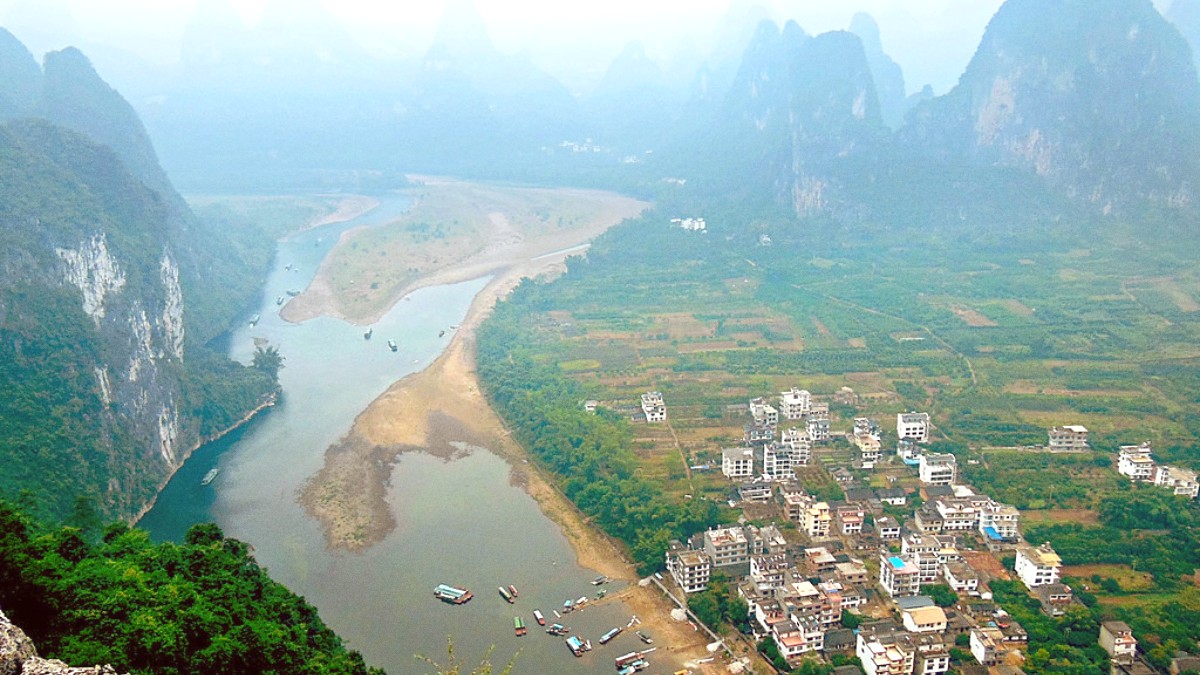
Guangxi, China
Temperatures in spring (March to May) typically range from 15°C to 25°C (59°F to 77°F). This period sees moderate rainfall, with humidity picking up towards May. The landscape becomes lush and green, making it a beautiful time for river cruises and cycling.
Autumn (September to November) temperatures are pleasant, ranging from 18°C to 28°C (64°F to 82°F). This season brings less rainfall, lower humidity, and often clear skies. Many regard autumn as the most comfortable and visually appealing season for outdoor activities and photography.
Monsoon season (June to August) brings heavy rainfall which causes higher river levels and possible localized flooding. This impacts popular activities like Li River cruises and Yulong River bamboo rafting. If water levels reach too high or currents become too strong, authorities may suspend boat tours for safety. Check local conditions if traveling during this period.
Typhoons: While Yangshuo is inland, the wider Guangxi region can be affected by the tail end of typhoons from the coast, especially during late summer and early autumn. These storms bring strong winds and very heavy rain.
June - August
Lush landscapes, but potential for heavy rain, flooding.
River activity suspensions possible due to high water levels.
March, June, November
Fewer crowds, reasonable prices.
March/November cooler, June brings rain.
Autumn & Spring
Li River Cruise, Rock Climbing, Cycling, Hiking.
Summer heat for intense outdoor activities.
Most foreign nationals need a visa to enter mainland China. The L-visa, a tourist visa, is the most common type. Application procedures typically involve online completion of a detailed form, appointment scheduling at a CVASC or a Chinese Embassy/Consulate, and in-person document submission. Biometric data (fingerprints) collection is common. Standard processing usually takes 4-7 business days, but express services are often available for an additional fee. Plan well in advance, as delays occur.
Passport validity of at least six months beyond departure, with two blank visa pages. A completed, printed, and signed online visa application form. A recent color passport-sized photo meeting specific requirements. Round-trip flight bookings and hotel reservations for your entire stay in China, including Yangshuo. Proof of legal residence if applying outside your home country. Copies of previous Chinese visas if applicable.
Visa fees vary by nationality and entry type. No general entry fees upon arrival beyond visa costs.
Complete an arrival card, present passport and visa, biometric data collection may happen, clear customs.
No special permits for Yangshuo; only for restricted border or Tibetan areas.
No specific vaccinations mandated for entry. Routine vaccinations are current. Hepatitis A, B, Typhoid recommended.
Start your visa application process well in advance, at least two to three months prior to departure.
Managing your finances in Yangshuo is simple with awareness of local currency and payment methods.
The official currency is the Chinese Yuan (CNY), also known as Renminbi (RMB). The symbol for Yuan is ¥. Banknotes come in denominations of ¥1, ¥5, ¥10, ¥20, ¥50, and ¥100. Coins are ¥0.1, ¥0.5, and ¥1.
Tipping is not customary in China and is generally not expected in restaurants, hotels, or taxis. Service charges may be included in the bill at some upscale establishments. Do not feel obliged to tip, as it sometimes causes confusion.
Yangshuo has local clinics and a county hospital (Yangshuo County People's Hospital). For serious medical needs, transfer to Guilin or a larger city like Guangzhou or Shenzhen may be needed for international-standard hospitals.
Yangshuo is generally a safe destination. Awareness of common health concerns and safety measures makes for a smooth trip.
Drink only bottled water, avoid tap water, be cautious with raw food. Wash hands frequently. Pack Anti-diarrhea medication.
Air quality fluctuates. Bring a Reusable mask if sensitive.
Stay hydrated, seek shade, wear lightweight clothing in summer.
Consult your doctor or a travel clinic several weeks before your trip for personalized vaccination advice.
China does not mandate specific vaccinations for entry from most countries. However, health professionals suggest ensuring your routine vaccinations are current, including MMR, DTP, and Polio.
Hepatitis A, Hepatitis B, and Typhoid vaccinations are often suggested for travelers to China, especially if you eat street food or travel to rural areas. Rabies and Japanese Encephalitis may be suggested for long-term stays or extensive outdoor activity in rural areas.
Tap water is not safe to drink without boiling or purification. Always use bottled water for drinking and brushing your teeth. Choose busy eateries for fresh ingredients; food should be thoroughly cooked and hot.
Police: 110 | Fire: 119 | Ambulance: 120.
Yangshuo County People's Hospital. For serious needs, consider transfer to Guilin.
Keep digital and physical copies of passport, visa, travel insurance, and emergency contacts separate from originals.
Heavy rains during monsoon season (June-August) cause flash floods, especially in low-lying areas. These floods disrupt travel and cause temporary closures of activities.
A comprehensive travel insurance policy is highly advisable. It protects against various unforeseen circumstances during your trip.
Covers medical emergencies, hospitalization, and emergency medical evacuation to better-equipped facilities.
Coverage for trip cancellation, interruption, or delays due to unexpected events.
Protection for lost or stolen luggage and other personal belongings.